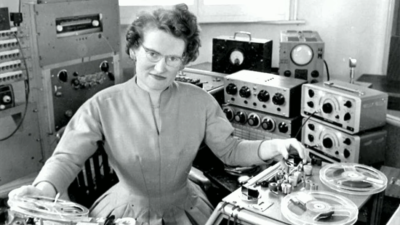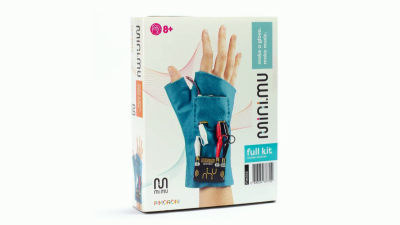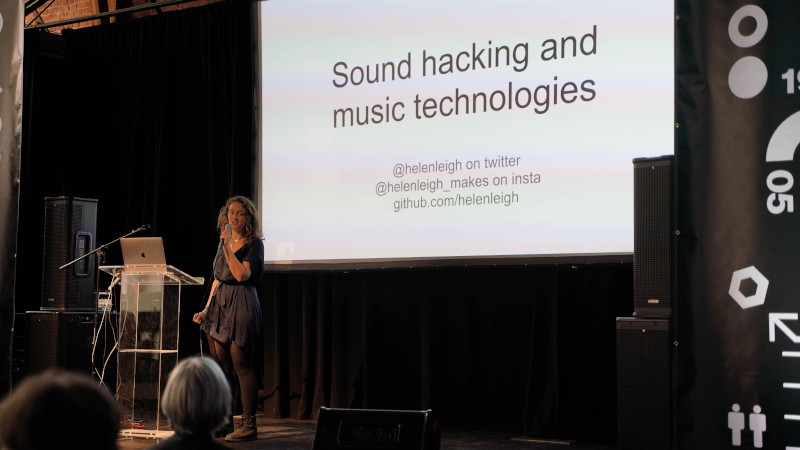Music throughout history has been inspired and changed by hackers and makers, and never moreso than in the 20th century. Helen Leigh is one such hacker, who brought a talk to Supercon to give us a crash course in the history of recording, electronics and music, and what the maker movement is doing in the music world today.
The tape recorder was an invention that kicked off a golden period of exploration in sound. Beginning in World War II, the Nazi propaganda machine cut and spliced recorded materials and disseminated them across broadcasting stations in Europe. To the astonishment of the Allies, certain German officials appeared to be making broadcasts from different studios at the same time, due to the high quality of the recording hardware. After the war, this technology was discovered by a group of Parisian recording artists who began to experiment with an art that became known as musique concrète, using tape hardware in weird and wonderful ways to create new sounds heretofore unheard in nature.

Helen’s talk explores this movement as an excellent example of the hacker ethos applied to musical creation. While much of the artistic output was amelodic and somewhat challenging to listen to, it nevertheless had a great impact on recording technology and techniques.
Helen recounts the work of Daphne Oram, who, inspired by musique concrète, went on to perform her own experiments, and eventually founded the BBC Radiophonic Workshop. This hallowed organisation became a hotbed of electronic and musical experimentation, developing innovative techniques in foley and laying the foundations for modern electronic music.
Particularly note worthy is the work done in the creation of the original Doctor Who theme song. Produced in the BBC Radiophonic Workshop by Delia Derbyshire, it was created entirely electronically from a score by Ron Grainer. In 1963, synthesizers weren’t readily available; instead, the whole composition was brought to life with signal generators, test equipment, tape loops, and recordings of white noise. Lengths of tape were cut and stuck back together with tape to produce the various parts of the track, with recordings sped up and slowed down to create the necessary pitch changes. Multitrack tape recording was not yet available, and thus the final mix was created by playing back several tapes all at the same time, with some necessary fussing required to get them all in sync. The cutting-edge production foreshadowed many innovations to come in recording technology.

Helen is prolific as a creative technologist, producing many builds that experiment with sound and music in their own way. Building hardware as diverse as musical ferns and choker-mounted vocoders, she’s pushed the envelope in what’s possible. Having produced a series of interactive sound sculptures, Helen has found that capacitive touch and gesture interactions are a key technology in this space, creating a natural and intuitive interface with the hardware. It’s a technique that can have pitfalls, particularly with wearable designs, but Helen’s perseverance and skill has overcome such challenges. Other works involve creating commercial products like the Mi.Mu advanced glove interface, and pushing cheap microcontrollers to do “more than just chiptunes”. With a passion for education as well as experimentation, there’s also a strong discussion of how community leads to ever greater creative output.
Helen’s Supercon talks serves as a great lesson on the history of hacking and music, as well as a tantalising primer for those keen to get involved today. It’s certainly opened our eyes to new possibilities, and we can’t wait to see what comes next!
















There were wire recorders even before tape recorders.
Sound hacking goes all the way back to the days of the cylinder, about 100 years ago. There is a good deal of very weird stuff that can be found on cylinder.
Oldest recorded porno is…?
Poor Beeb workshop. Everyone has twisted the history of Dr Who theme song so much for their purposes, that the truth will never be known.
And the guys that did the soundtrack for Forbidden Planet were doing much the same sound hacking, but almost 10? years earlier.
Interesting talk. Daphne Oram’s story is fascinating. She was not well treated by the BBC. I knew about the “hackers” in Paris during the 40s. My Dad was a classical musician and told me about it when the old Third Programme (forerunner to BBC Radio 3) broadcast some of their work in the early 60s. Challenging but technically very interesting. Sometime in the early 80s a sound engineer friend made a station ident by recording every note on the piano keyboard using a reference tone generator onto 1/4″ tape and then editing it together to make a tune. By making sure they were all at the same level, it looked like the standard 1Khz reference at 4 on a PPM! Unless of course you listen to it. I must ask him if he still has it and if I can have an MP3.
What about Edgard Varese ? Bob Moog ? Alan Robert Pearl Man ? Don Buchla ?